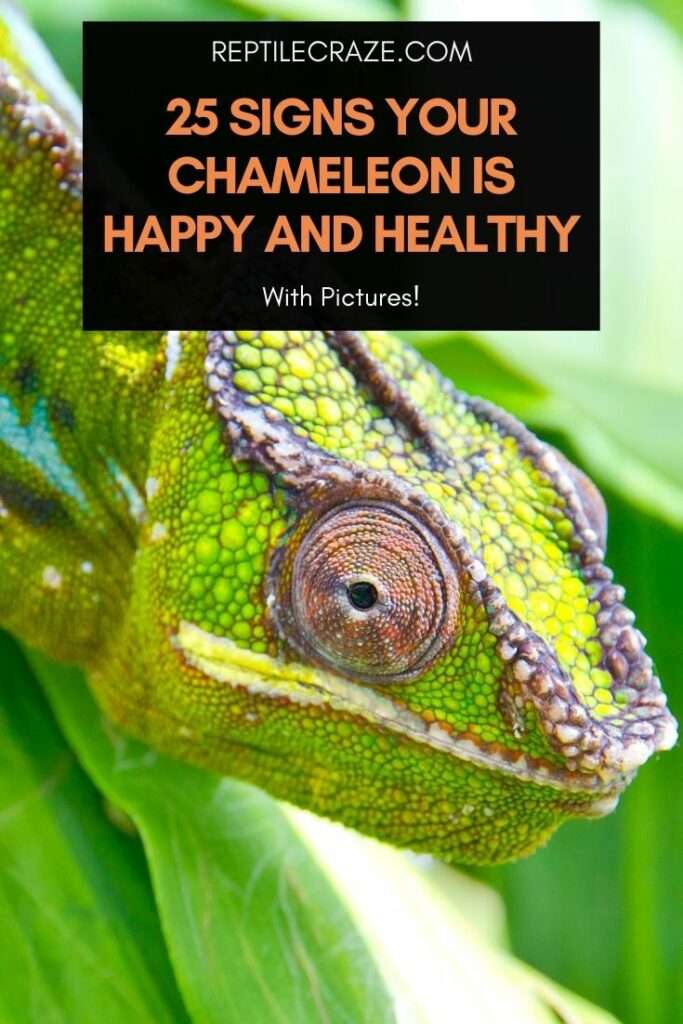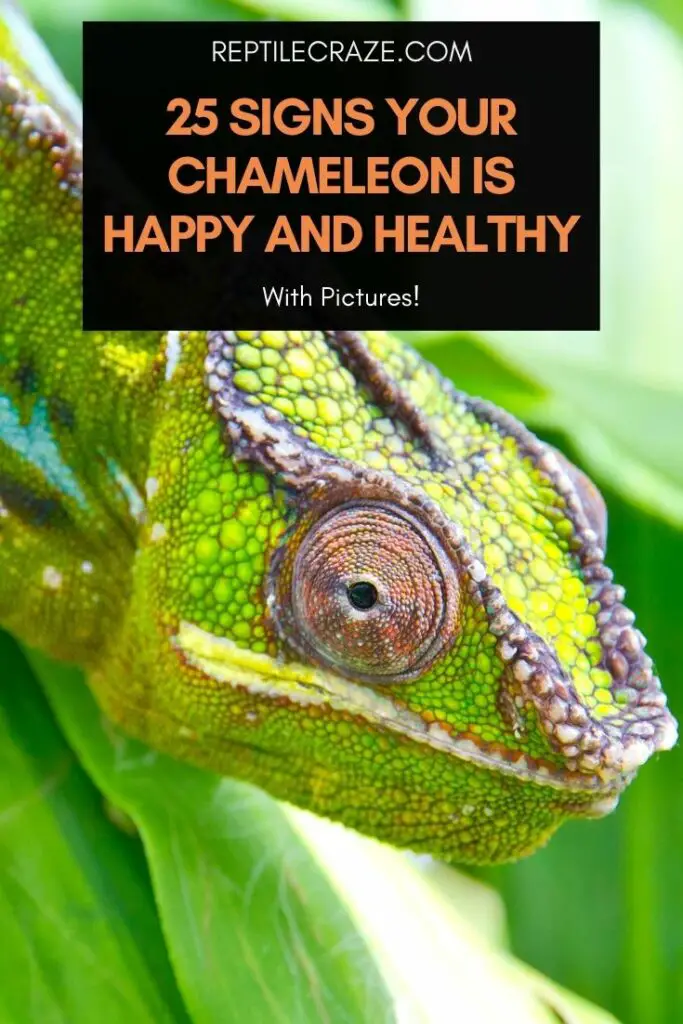Have you ever wondered if your chameleon is happy? As a pet owner, it’s natural to worry about your pet’s well-being and happiness. Chameleons may not show their emotions like dogs or cats, but they do have ways of letting us know how they’re feeling. In this article, we’ll discuss some signs that indicate your chameleon is happy and healthy.
Whether you’re a new or experienced chameleon owner, understanding your pet’s behavior is crucial. By paying attention to their body language and behavior, you can ensure that your chameleon is living a happy and healthy life. So, let’s dive into the world of chameleon behavior and learn how to tell if your pet is happy.
Chameleons are known for their ability to change color, but this doesn’t necessarily indicate their mood. A happy chameleon is a healthy chameleon. Signs of a happy chameleon include bright, alert eyes, a healthy appetite, and regular shedding. They also need a comfortable temperature and humidity level, as well as a spacious enclosure with plenty of hiding places and climbing opportunities. Observe your chameleon’s behavior regularly to ensure they are content and healthy.

How Do I Know if My Chameleon is Happy?
Chameleons are fascinating creatures that are known for their unique ability to change their color. They are also known for being quite solitary and independent, which can make it difficult to determine whether they are happy or not. However, there are some signs that you can look out for to determine if your chameleon is happy.
Physical Signs of a Happy Chameleon
When a chameleon is happy, it will display certain physical signs that indicate its contentment. One of the most obvious signs is that it will have bright, vivid colors. A happy chameleon will have a vibrant green color with bold stripes or spots that are clearly defined. It may also have a bright yellow or orange coloration.
Another physical sign of a happy chameleon is that it will be active and alert. It will move around its enclosure and explore its surroundings. It may climb on branches or bask in the sunlight. A happy chameleon will also have a healthy appetite and will eat regularly.
Behavioral Signs of a Happy Chameleon
In addition to physical signs, there are also behavioral signs that indicate a chameleon is happy. A happy chameleon will be calm and relaxed. It will not be aggressive or defensive, and it will not puff up or hiss. Instead, it will be curious and interested in its surroundings.
A happy chameleon will also be comfortable with its owner. It may approach the front of its enclosure when its owner is nearby, and it may even climb onto their hand or arm. A happy chameleon will also be comfortable being handled, although it is important to handle them gently and with care.
Creating a Happy Environment for Your Chameleon
If you want to ensure that your chameleon is happy, it is important to provide it with a suitable environment. Chameleons require a spacious enclosure with plenty of climbing opportunities, such as branches and vines. They also require a source of UVB lighting, which is essential for their health and wellbeing.
It is also important to maintain the appropriate temperature and humidity levels in the enclosure. Chameleons require a temperature range of 72-82°F during the day and 60-70°F at night. Humidity levels should be kept between 50-70%.
In addition to providing a suitable environment, it is also important to feed your chameleon a balanced diet. Chameleons require a variety of insects, such as crickets, mealworms, and waxworms, as well as occasional fruits and vegetables.
Benefits of Keeping a Happy Chameleon
Keeping a happy chameleon can be a rewarding experience. When your chameleon is happy, it will be more active and engaging. It may even display unique behaviors, such as color changes or vocalizations. A happy chameleon will also be healthier and more resilient to disease.
In addition, keeping a happy chameleon can be a great learning experience. Chameleons are fascinating creatures with unique characteristics and behaviors. By observing your chameleon and learning about its needs and preferences, you can gain a greater understanding and appreciation for these amazing animals.
Conclusion
In conclusion, keeping a happy chameleon requires providing a suitable environment, feeding a balanced diet, and observing physical and behavioral signs of contentment. By doing so, you can ensure that your chameleon is healthy, happy, and engaged.
Frequently Asked Questions
Chameleons are fascinating pets that require a lot of care and attention. As a responsible owner, it’s important to know how to keep your chameleon happy and healthy. Here are some common questions about chameleon happiness.
How can I tell if my chameleon is happy?
Chameleons are not like dogs or cats that show their emotions in obvious ways. However, there are some signs that your chameleon is happy and content. A happy chameleon will have bright, alert eyes, a healthy appetite, and will be active and curious. They will also have vibrant colors and will not show any signs of stress or illness.
On the other hand, a stressed or unhappy chameleon may have dull colors, sunken eyes, and will be lethargic or agitated. They may also have a decreased appetite or may not eat at all. If you notice any of these signs, it’s important to take your chameleon to a vet to ensure they are healthy.
What kind of environment does my chameleon need to be happy?
Chameleons are arboreal creatures, which means they need a tall enclosure with lots of branches and foliage to climb and hide in. They also need a heat lamp and UVB light to regulate their body temperature and get the necessary nutrients. The enclosure should be misted regularly to maintain the correct humidity levels.
It’s important to provide a comfortable and stable environment for your chameleon. Sudden changes in temperature or humidity can stress them out. Keep their enclosure clean and provide fresh water and food daily. With the right care and environment, your chameleon will be happy and healthy.
Can I play with my chameleon to make them happy?
Chameleons are not social animals and do not enjoy being handled or played with. In fact, handling them too much can stress them out and cause health problems. It’s important to give your chameleon space and respect their boundaries. Instead of playing with them, provide them with a comfortable and stimulating environment to explore and climb in.
You can also observe your chameleon from a distance and learn their behavior and habits. This will help you understand what makes them happy and what causes them stress. By providing them with the right environment and care, your chameleon will thrive and be happy.
What kind of diet does my chameleon need to be happy?
Chameleons are insectivores and need a varied diet of live insects, such as crickets, roaches, and mealworms. They also need a source of calcium, such as calcium dust or supplements, to maintain their bone health. It’s important to feed your chameleon the right size and type of insects, as well as gut-load them with nutritious food before feeding.
Feeding your chameleon a healthy and varied diet will keep them happy and healthy. Avoid feeding them too many treats or fatty foods, as this can cause health problems. Consult your vet or a reptile expert for advice on the best diet for your chameleon.
What should I do if my chameleon seems unhappy or stressed?
If you notice any signs of stress or unhappiness in your chameleon, it’s important to address the issue promptly. Check their environment and make sure it’s comfortable and stable. Ensure they are getting the right diet and supplements, and that their enclosure is clean and misted regularly.
You can also observe their behavior and see if anything is causing them stress, such as loud noises or too much handling. If you are unsure what is causing their unhappiness, take them to a vet or reptile expert for a check-up. With the right care and attention, your chameleon will be happy and healthy.
4 signs your chameleon is happy 🙂 #4kvideo #reptiles #chameleon #funnyanimals
In conclusion, ensuring that your chameleon is happy and healthy is essential for both the chameleon and its owner’s well-being. As a responsible chameleon owner, it is crucial to pay close attention to your pet’s behavior and environment. By providing a comfortable and stimulating living space, offering a well-balanced diet, and monitoring your chameleon’s physical and emotional health, you can ensure that your pet is happy and thriving.
Remember that each chameleon is unique, and what makes one happy may not work for another. Therefore, it is essential to get to know your chameleon’s personality and preferences and make adjustments accordingly.
Finally, if you notice any signs of stress or illness, seek veterinary care promptly. With proper care and attention, you can have a happy and healthy chameleon that will bring joy to your life for years to come.


